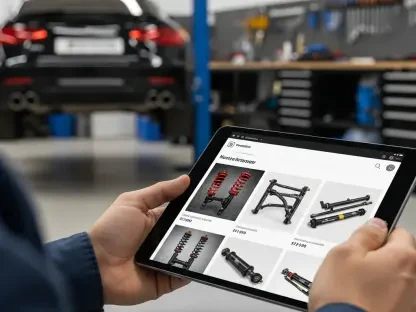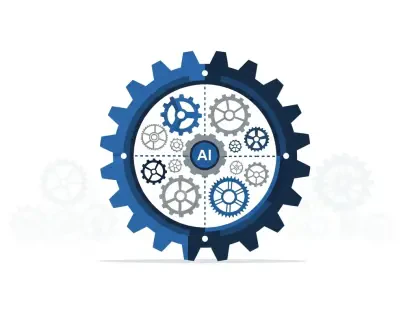Emerging markets have consistently faced challenges in maintaining efficient retail operations, with small storefronts often struggling to keep up with supply and demand intricacies. Unilever has recently introduced a groundbreaking digital distributive trade platform that is turning the tide. Deployed in key markets like Indonesia, Vietnam, Pakistan, the Philippines, Thailand, and soon Bangladesh, this AI-powered platform is reshaping the retail landscape. It is designed to bridge the gap between Unilever orders and micro-retailers, ensuring a scalable and adaptable system that meets global standards while addressing unique local needs.
Transforming the Supply Chain
Comprehensive Supply Chain Management
The new platform impacts nearly half a million retailers, 600 distributors, and over 6,000 sales representatives by overseeing the entire supply chain process. This cloud-based system facilitates every step, from demand generation and order capture to fulfillment and customer service, making operations considerably smoother and more efficient. Processing an impressive 75,000 orders daily, the platform supports annualized sales of €2.5 billion. Similar to the Shikhar model implemented in India, which showed positive results, the system is being tailored to meet Latin America’s specific market demands.
Retailers historically faced issues such as irregular deliveries and limited access to promotions. With the advent of Unilever’s digitization efforts, retailers now have access to an eB2B app that mirrors the tools used by sales representatives. This application enables them to access the complete product catalog, avail discounts, and place orders round-the-clock, regardless of internet reliability. The positive impact on business opportunities, sales growth, and service convenience has been significant, offering a previously unseen level of operational control to small retailers in these markets.
Enhanced Data and Insights
A notable benefit of this digitization is the wealth of data and insights gathered across the value chain. At a macro level, this data helps Unilever refine forecasting and strategic planning for different channels. On a micro level, it aids in boosting loyalty and sales at individual stores. AI-driven recommendations provided by the platform enable sales reps to optimize their visits, transforming them from mere order-takers to strategic advisors. This, in turn, supports more targeted, personalized engagement strategies, and efficient sales interactions, directly improving customer service and retailer satisfaction.
The platform’s capacity to generate detailed insights also extends to the broader distribution network. Automating resupply processes, managing settlements, credits, and returns, and integrating route optimization tools ensure more cost-effective deliveries. By leveraging a global technology platform, Unilever has markedly enhanced the service quality for millions of mom-and-pop stores, helping them stay competitive and fostering long-term growth and resilience in the retail sector.
Elevating Retail Operations
Retail Dynamics and Technology
Despite the growing prevalence of large supermarkets, small, family-run stores still dominate the retail marketplaces in many emerging markets. These traditional mom-and-pop stores, which are expected to grow at an annual rate of 7.6% until 2030, are critical for communities. Unfortunately, these smaller establishments often grapple with issues such as inconsistent stock delivery and limited promotional access. By providing an advanced eB2B app, Unilever’s initiative dramatically enhances the supply chain efficiencies and ensures that retailers can seamlessly access various products.
The technology-driven approach allows retailers to place orders, navigate comprehensive product catalogs, and utilize available discounts despite potential internet connectivity issues. This new system has significantly improved how these retailers operate, ensuring they can meet customer demands more effectively. The transformation has led to an increase in sales and created new business opportunities, substantially elevating service convenience and operational efficiency.
Integrating Advanced Analytics
Another critical feature of Unilever’s platform is integrating advanced analytics and AI to drive strategic insights at both macro and micro levels. By facilitating data collection and analysis across the supply chain, Unilever can forecast demands more accurately and strategize accordingly. On the ground level, AI recommendations assist sales representatives during their visits to retailers, making these interactions more strategic and personalized.
These AI-enabled insights allow sales reps to become valuable advisors, offering tailored solutions and promotions to retailers based on their specific needs. This results in better-targeted engagement strategies, optimizing sales visits, and improving overall customer service. Moreover, these insights help personalize engagement methods, ensuring that each interaction is meaningful and contributes to stronger loyalty and increased sales. The platform’s data intelligence capabilities thus empower representatives and ensure retailers receive accurate and relevant support tailored to their needs.
Digital Distribution Excellence
Streamlining Distribution Processes
Unilever’s platform also plays a crucial role in optimizing the efficiency of distributors. By automating several essential processes such as resupply management, credit settlements, and returns, the platform ensures smoother and faster operations. Additionally, it incorporates route optimization tools that aid in delivering products more cost-effectively, significantly reducing both time and transportation expenses. This streamlined approach not only enhances the effectiveness of distributors but also directly benefits retailers by ensuring timely and efficient deliveries.
The platform’s automated processes and optimization tools reduce operational complexities, allowing distributors to focus on expanding their reach and improving service quality. As a result, retailers receive timely restocks and better service, leading to sustained growth and competitiveness. This kind of technology-driven efficiency is essential in emerging markets where logistical challenges can often hinder business operations.
Empowering Retailers
Ultimately, the digital transformation spearheaded by Unilever helps millions of small retailers fortify their market positions. By leveraging advanced technologies, these retail stores can stay competitive despite the growing dominance of large supermarkets. The ability to access comprehensive product information, place orders seamlessly, and benefit from data-driven insights enables stores to build resilience and thrive in an increasingly competitive landscape.
The platform, by simplifying various facets of the supply chain and empowering stores with essential tools, ensures long-term sustainable growth for retailers. With the aid of AI and e-commerce solutions, Unilever confirms its commitment to enhancing the overall ecosystem within which these small stores operate. Such initiatives not only bolster the retail sector but also contribute to the broader economic growth and development of emerging markets.
Future of Retail in Emerging Markets
Emerging markets have consistently struggled to maintain efficient retail operations, with small storefronts often finding it difficult to balance supply and demand. However, Unilever has recently rolled out an innovative digital distributive trade platform that is set to change the game. This AI-powered system has been launched in significant markets like Indonesia, Vietnam, Pakistan, the Philippines, and Thailand, with plans to expand to Bangladesh soon.
This platform bridges the gap between Unilever’s orders and micro-retailers, ensuring a scalable and adaptable system that meets both global standards and local needs. The goal is to reshape the retail landscape by providing a more efficient, streamlined approach to managing stock and orders. This alignment helps small retailers serve their customers better, drive business growth, and sustain operations. By addressing the unique challenges faced by small storefronts in these emerging markets, Unilever is setting a new standard in the retail industry.









